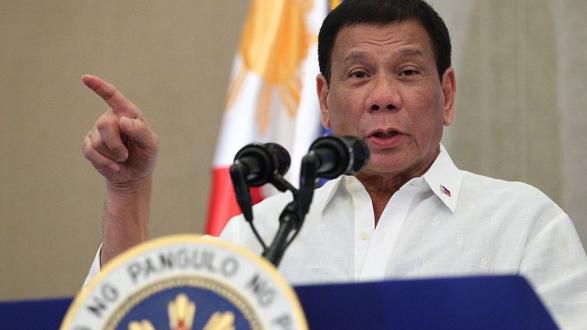Global Beat: Rexit, Philippine Drug War, and More
March 16, 2018
In:
Global Beat is your weekly stop for news from around the world. Join us every Friday morning for important stories you should know about.
This week, Secretary of State Rex Tillerson is out; The Philippines pull out of the International Criminal Court; Britain expels Russian diplomats; and more.
____________________
Americas
U.S. Secretary of State Rex Tillerson was fired on March 13th, just eight days after the resignation of Gary Cohn, the White House’s top economic advisor. Mr. Tillerson differed with the president on many topics, including the Iran Nuclear Deal. Since the beginning of Trump’s term, there have been more than twenty high-profile exits, meaning he has let go of more top-level staff than his five most recent predecessors. The removal of Tillerson has cemented feelings of unpredictability and unreliability surrounding current negotiations for other foreign leaders, including Iran’s foreign minister Mohammed Javad Zarif and the Iran Nuclear Deal.
Also check out:
-
Top U.S. diplomat in Latin America leaves in protest, swelling an exodus – The Washington Post
Central & South Asia
The Sri Lankan government has accused Facebook for deadly anti-Muslim riots after declaring a nationwide state of emergency last week. The riots began after the death of a Sinhala Buddhist man was beaten by a group of Muslim men in the Kandy district on March 3rd. Facebook and other social messaging networks were blocked by the Sri Lankan government after three continual days of riots, in which at least two people were killed and 232 homes were destroyed. The ban on social media was lifted on Wednesday this week, after Sri Lanka’s Muslim minority claimed that it was ineffective in controlling the violence. Facebook has served as a key platform for Buddhist groups to converge in specific areas and as a place to share videos of the violence. This marks the third major attack by Sinhala Buddhist groups on Muslims since November.
Also check out:
China & East Asia
China’s national legislature officially approved the legislative changes that would let Xi Jinping rule indefinitely on Sunday. Mostly a symbolic measure, only two out of 2,964 members of the legislature voted against the changes. This decision strikingly resembles the power and ideology of the Chinese Communist Party’s founder and Communist Revolution leader, Mao Zedong, in the early 20th century. President Xi’s ideology, “Xi Jinping Thought on Socialism with Chinese Characteristics for a New Era” is officially the new political doctrine and has already been implemented into media, schools, billboards, and everyday life.
Also check out:
- Time for Japan’s prime minister to change the constitution – The Economist
Europe & Russia
Britain is set to expel 23 Russian diplomats, the biggest expulsion since the Cold War, over a chemical attack on a former Russian spy in England this week. Former Russian spy, Sergei Skripal, and his daughter Yulia are in critical condition after being exposed to a nerve agent developed in Russia called Novichok. Britain has received statements of support from the United States, the European Union, and NATO, and is planning to coordinate an international response to the attack. In retaliation, the Kremlin confirmed on Friday that it would halt all meetings and expel all British diplomats from Russia. Few other comments have been made by Russia, in light of the first round of the Russian presidential election taking place this Sunday.
Also check out:
Middle East & North Africa
In an interview this week, Saudi Arabia’s crown prince Mohammed bin Salman pledged to develop nuclear weapons in the event that Iran does. This statement arose in response to Saudi Arabian fears of Iraninan influence in the region amidst the proxy conflicts in Yemen. Historically, the two countries have supported opposing sides in regional conflicts. However, Iran responded with comments denying all possibilities of developing a nuclear program and shared that they intend to promote peace in the region.
Also check out:
- Militant threat emerges in Egyptian desert, opening new front in terrorism fight – The Washington Post
Southeast Asia & Oceania
President Rodrigo Duterte withdrew the Philippines from the Rome Statute, the treaty that established the International Criminal Court (ICC) this Wednesday. About a month ago, the ICC began an initial investigation into the 12,000+ casualties in the Philippines caused by Duterte’s drug war that began in 2016. Duterte took action to withdraw from the treaty because he believes “it is apparent that the ICC is being utilized as a political tool against the Philippines,” however, the withdrawal could give the court more of a reason to proceed with a full-fledged investigation. It will take at minimum a year for the Philippines to withdraw from the treaty, and during that time the country will continue to be full member and can be persecuted for any international crime that persists.
Also check out:
- Southeast Asian leaders gather for first Australia summit – The Washington Post
Sub-Saharan Africa
Violent protests throughout Guinea, including its capital Conkary, left 11 dead on Wednesday. Protests have included demands for higher teacher wages as well as insistence for results of a highly anticipated election. Guinea has not conducted presidential elections since the end of military rule in 2010 due to political instability and poverty. President Alpha Condé’s party is claiming victory from the elections in February of this year; however, the official winners have not been announced and many are claiming electoral fraud. Protests in mining towns Boke and Kamsar have also affected international trade of aluminum ore bauxite, one of the country’s main exports and sources of income.




